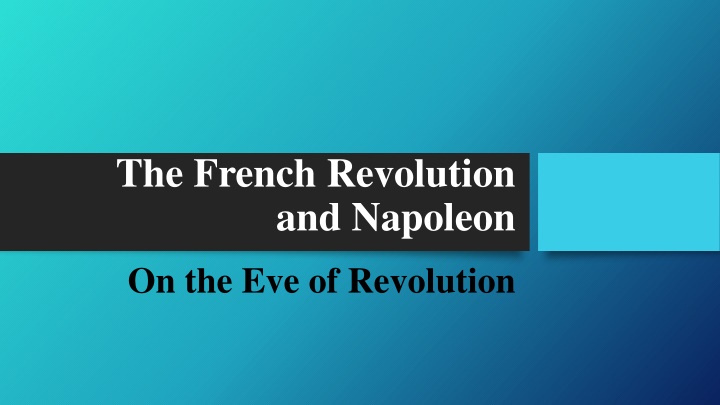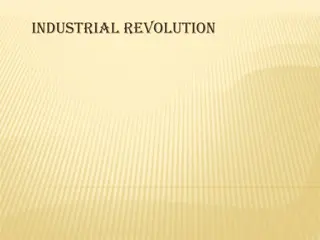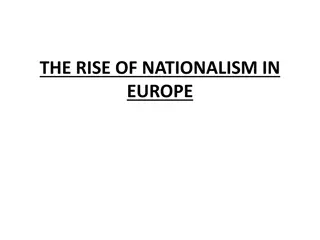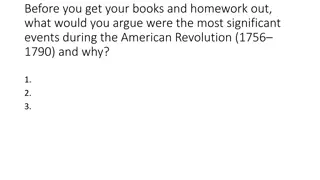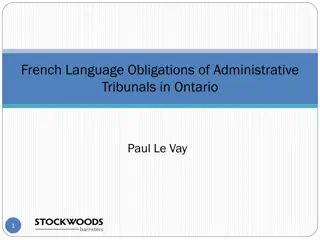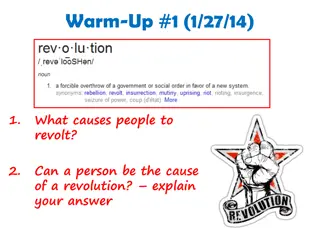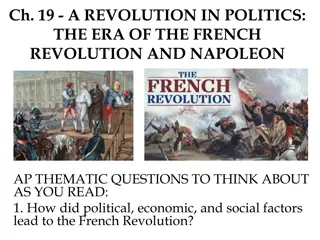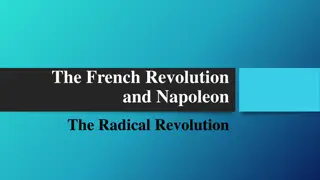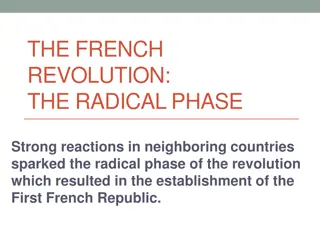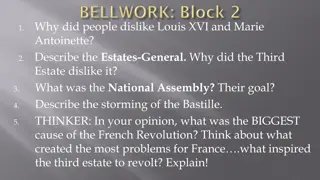French Society Divided on the Eve of Revolution
The French society on the cusp of revolution was sharply divided into the three estates - the clergy, the nobility, and the commoners. The First Estate consisted of the clergy, enjoying wealth and power, while the Second Estate comprised the nobility, facing challenges of maintaining status amidst rising prices. The Third Estate, comprising the majority of the population, included diverse groups such as the bourgeoisie, who played a crucial role in the forthcoming upheaval.
Download Presentation

Please find below an Image/Link to download the presentation.
The content on the website is provided AS IS for your information and personal use only. It may not be sold, licensed, or shared on other websites without obtaining consent from the author.If you encounter any issues during the download, it is possible that the publisher has removed the file from their server.
You are allowed to download the files provided on this website for personal or commercial use, subject to the condition that they are used lawfully. All files are the property of their respective owners.
The content on the website is provided AS IS for your information and personal use only. It may not be sold, licensed, or shared on other websites without obtaining consent from the author.
E N D
Presentation Transcript
The French Revolution and Napoleon On the Eve of Revolution
French Society Divided The ancient regime (old order) still clung to an outdated social order that had developed in the Middle Ages Population of France was divided into 3 estates (social classes)
The First Estate Made up of the clergy (about 1% of France s population) Enjoyed enormous wealth and privilege/maintained a great amount of political power
The First Estate Church owned about 10% of the land in France Collected tithes from the people, but paid no direct taxes to the government Estate divided by wealth High church officials extremely wealthy Parish priests usually as poor as their congregations
The First Estate Did provide some social services- hospitals, schools, orphanages Enlightenment thinkers began questioning idleness of clergy, involvement in politics, and intolerance of dissent Clergy condemned the Enlightenment for undermining religion
The Second Estate Made up of the titled nobility of France (about 1% of France s population) Cardinal Richelieu and Louis XIV crushed a lot of noble power, but still gave them top positions in government, army, courts, and the Church Under strict royal control
The Second Estate Although many nobles lived at Versailles, some lived far from the center of power and received little income Felt pinched trying to maintain their status when prices were rising Many hated absolutism and a bureaucracy that employed middle class men in positions originally held by the nobility Did not pay taxes
The Third Estate Made up of everyone else in France (extremely diverse) Made up 98% of the population of France
The Third Estate At the top were the bourgeoisie (middle class) made up of bankers, merchants, lawyers, doctors, etc. Bulk of the estate was the rural peasants Among the poorest members were the urban workers
The Third Estate Members of the estate resentful at other two estates for the privileges they enjoyed Members of the middle class could purchase political offices and titles, but best jobs still reserved for nobility Urban workers earned meager wages, and struggled to feed themselves and their families Third Estate burdened by taxes on everything, paid the bulk of taxes
Financial Troubles Economic issues added to social tensions France had ongoing financial crisis due to years of deficit spending (a government spending more money than it takes in)
Soaring National Debt Louis XIV died leaving France in deep debt due to his lavish lifestyle The Seven Years War (French and Indian War) and the American Revolution strained the royal treasury even more French government borrowed more money to cover gap between income and expenses
Soaring National Debt In late 1780s, bad harvests led to food prices soaring Brought hunger to poorer peasants To solve the crisis, government would have to increase taxes, decrease expenses, or both, which received pushback from First and Second Estates
Economic Reform Fails The heirs to Louis XIV were not capable of meeting an economic crisis Louis XV pursued pleasure and continued to run up the national debt Louis XVI was well-meaning, but weak and indecisive Did choose Jacques Necker, a financial expert to be his finance minister
Economic Reform Fails Necker urged Louis to reduce extravagant court spending, reform government, and abolish tariffs on internal trade Was eventually dismissed when he suggested taxing First and Second Estates Crisis deepened so much the wealthy and powerful demanded the King call the Estates-General (legislative body of consisting of members from the 3 estates) to help alleviate the situation
Economic Reform Fails Estates-General hadn t been called in 175 years due to the king s fear the nobles would try to take back their power Nobles saw the calling as a chance to enact reforms Wanted to bring the monarch under control and regain power for themselves
Estates-General As 1788 came to a close, France tottered on the brink of bankruptcy Bread riots spreading Nobles, fearful of taxes, denounced royal tyranny Louis XVI forced to call Estates- General to meet at Versailles
Estates-General King instructed estates to prepare grievance notebooks Called for reforms such as fairer taxes, freedom of the press, regular meetings of the Estates-General Denounced regulations making products expensive and servitude for life
Estates-General Delegates from the Third Estate mostly lawyers, middle-class officials, and writers Familiar with works of Voltaire, Rousseau, and other Enlightenment thinkers Went to Versailles not only to solve financial crisis but to demand reform
Estates-General Conflict erupted immediately over how to vote Each Estate only received one vote First and Second Estates could out-vote Third Third Estate wanted votes counted by head Led to weeks of stalemate
The Tennis Court Oath Frustrated Third Estate took daring step in June 1789 Believed they represented the people and declared themselves the National Assembly When their meeting hall was locked, they met on the indoor Tennis Court and took an oath to not separate until a constitution had been established Reform minded nobles and clergy joined the Assembly, forcing Louis XVI to accept it
Storming the Bastille Royal troops gathered around Paris, and rumors began that the King planned to dissolve the Assembly July 14, 1789- 800 Parisians assembled outside the Bastille and demanded weapons and gunpowder believed to be kept there The commander refused and fired on the crowed sparking a conflict that ended with the crowd breaking through the defenses
Storming the Bastille The commander and five guards killed, few prisoners released No weapons found Bastille was a symbol of abuse by the monarchy, the riot was a wake-up call to Louis XVI Still celebrated as national independence day
